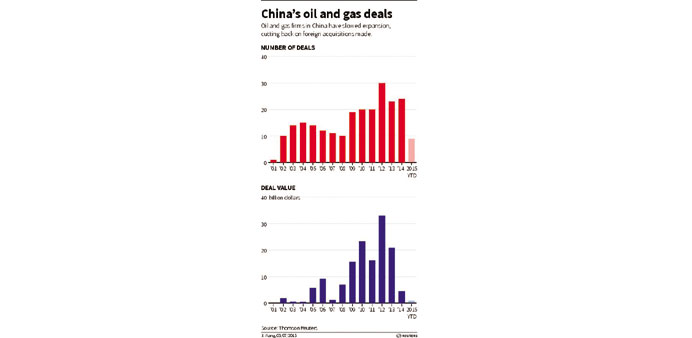Reuters/Beijing
As global oil giants struggle with plunging earnings, Chinese state oil firms are unlikely to be waiting in the wings to buy any unwanted assets.
After pouring tens of billions of dollars into foreign energy projects in the last two decades, China’s rush to purchase overseas oil and gas projects is over – at least for now – and some state firms are even looking to sell assets.
China, the world’s second-biggest oil consumer, invested more than $140bn in the sector in the period from 1993, according to Thomson Reuters data.
But Chinese firms have slammed the brakes on after a slide in crude prices has slashed returns on some investments and with deals coming under greater scrutiny since Beijing stepped up an anti-graft campaign two years ago.
The shift started last year but has become more pronounced in recent months, industry sources say, with the focus for management now on more mundane goals such as cutting costs and improving returns from assets rather than new purchases.
“The era of rapid, sometimes blind, expansions is over,” said Luo Zuoxian, an economist at a research arm of Sinopec Group, parent of Sinopec Corp, China’s No.2 energy giant. Luo does not foresee any big acquisitions in the next three to five years.
Sinopec, which in late 2013 surprised the market by putting up for sale some shale gas assets in Canada, may now look to offload more “non-core” assets, senior company sources said. Sinopec Group is also shaking up its global exploration unit and re-assessing its broader investment strategy to identify “core areas” for spending in future.
This could mean that projects in places such as eastern Africa, which is rich in natural gas, could fall outside the targets, because to exploit them would require heavy spending and years to get returns, one of the sources said.
Sinopec declined to comment on divestment plans.
Beijing’s anti-graft drive, which has felled about a dozen top oil executives, has also made it harder to strike new deals.
New chairmen have been appointed in May at the top three energy groups – China National Petroleum Corp (CNPC) , parent of PetroChina, Sinopec and CNOOC, parent of CNOOC Ltd.
“The anti-graft climate sends a message: ‘to do less is safer’”, said an investment official at a state oil firm.
China’s graft watchdog said in April that some of Sinopec’s overseas investments had generated low returns or even no revenue after years of output.
“It’s definitely a dialing back of what they want to achieve. Previously it was growth at all cost, now the mantra is return on value,” said Neil Beveridge of Bernstein Research.
In a bid to cut spending, CNPC said last week it has started renegotiation with contractors on 24 overseas projects including gas ventures in Russia and Mozambique.
Thomson Reuters data showed outbound oil and gas deals were $4.4bn last year, the lowest since 2008.
China has had highs and lows in investments going back.
A decade ago, CNOOC pulled an $18.5bn bid for US firm Unocal after intense opposition from Washington, though in 2013 it bought Canada’s Nexen Inc for $15.1bn, China’s largest foreign acquisition.
Asked about its strategy in a low oil price environment, CNOOC said it would prudently invest, balancing short-term return and long-term development and focusing on cash flow, as well as optimising assets and capital allocation.
CNOOC sold several small conventional gas assets last year, and Sinochem Group pulled back its team of five from the Wolfcamp shale operation in Texas, company sources said. Sinopec’s Argentine oil and gas venture, bought in 2010 from Occidental Petroleum Corp, could be considered for divestment, said a company source.
But as China remains a top oil buyer, with imports of crude on two occasions exceeding that of the US this year, some say it is only a matter of time before Chinese firms buy abroad again, albeit more cautiously.
“Once the new management has settled down, the low interest rate environment in China together with stabilising oil prices should improve the cash flow, enabling them to exploit opportunistic acquisitions overseas, perhaps starting 2017,” said Gordon Kwan of Nomura research.

